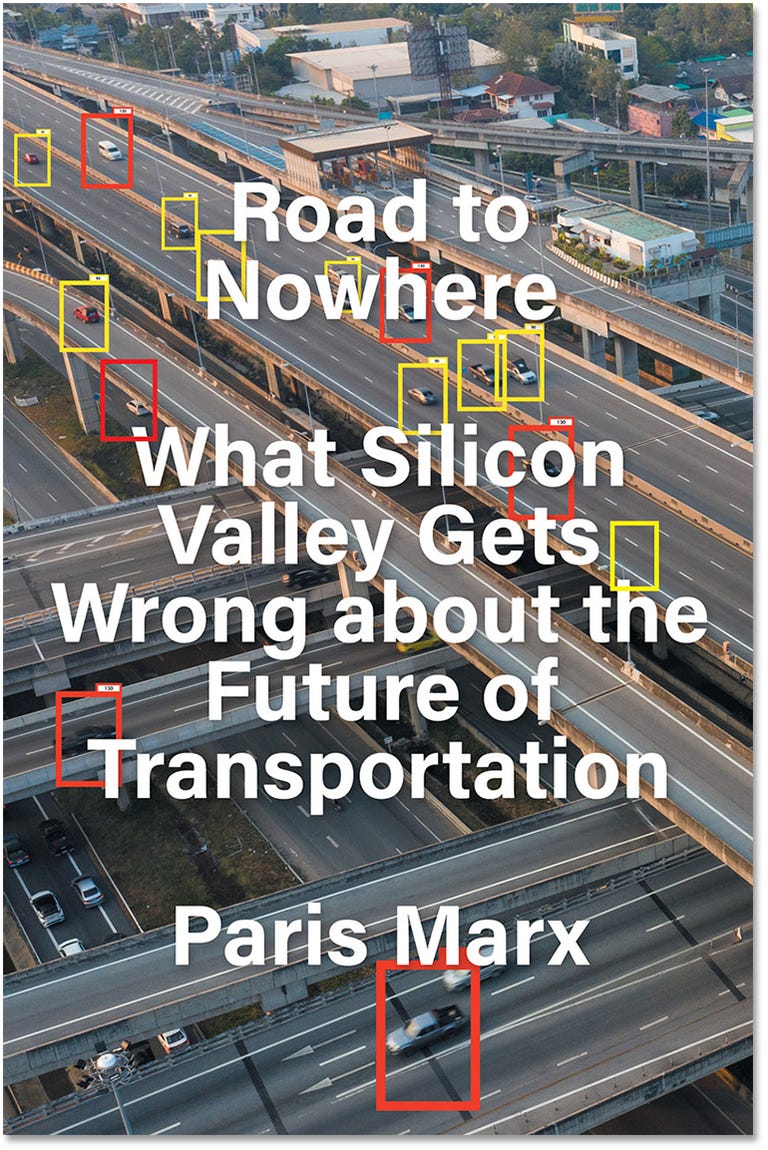
Road to Nowhere: What Silicon Valley Gets Wrong About the Future of Transportation • By Paris Marx • Verso • 272 pages • ISBN: 978-1-83976-588-9 • £8.99 Image: Verso
Fifty years from now, will mobility look more like today or more like 100 years ago? I think about this often. It’s not that anyone sees horses making a comeback, but it seems a win for everyone except car companies and Big Petrol if the urban landscape fills with bicycles, pedestrians, and other forms of micromobility — and, if we have any sense, a lot fewer cars.
If we don’t have sense…I’m reminded of an interview circa 2010 with a Silicon Valley self-driving car proponent who envisioned pods small enough to drive into a building and right onto the elevator. I couldn’t imagine anything less healthy.
Lots fewer cars is the future Canadian technology writer Paris Marx, author of Road to Nowhere: What Silicon Valley Gets Wrong about the Future of Transportation, imagines — Elon Musk is not going to save us!
On the internet, Silicon Valley has brought us useful and popular services, but at the price of pervasive data gathering and surveillance that increasingly entrenches existing power structures rather than challenges them. The same, Marx warns, is inherent in Big Tech’s approach to mobility, which enshrines the fast, single-occupancy car preferences of a small wealthy, male elite over the needs of the rest of us.
Electric vehicles are less bad for the environment than their fossil fuel-powered counterparts — but they are still cars, with all the congestion, existential risks to pedestrians and cyclists, and resource requirements that implies. Silicon Valley likes to change the world — but only in very particular ways to serve a particular few. The problem with cars isn’t just human drivers. The problem with cars is cars.
Marx highlights the many ways in which cars have been normalised, subsidised and accommodated, and explores the options they displaced. Bicycles, which brought women greater freedom, were shoved aside to make way, new dangers forced pedestrians off the streets, and, in some cases, subtle design choices embedded antisocial values such as racism deep into the public infrastructure.
Around 1960, for example, New York urban planner Robert Moses ordered the bridges on the Southern State Parkway across Long Island to be built too low for buses as a way of excluding poor and black bus riders from Jones Beach. Around that same time, planners built urban highways to carve through areas they considered to be ‘urban blight’, regardless of the residents’ wishes or the longevity of their communities.
As Marx shows, today’s car-dominated world was not an inevitable result of consumer choice, but imposed upon Americans. Making vehicles electric and/or autonomous — which, as he writes, has turned out to be far more difficult than technologists anticipated, and as Christian Wolmar predicted in 2018 — changes none of this.
Marx’s book has particular resonance with other recent reading. His discussion of the normalisation of millions of traffic deaths resonates with Jessie Singel’s There Are No Accidents, which argues that calling death or injury ‘an accident’ is a way of deflecting responsibility for the design choices that create the conditions for ‘accidents’ to happen. Second is Douglas Rushkoff’s new book, Survival of the Richest, in which Silicon Valley billionaires plan their post-catastrophe escape from the rest of us.
It is this isolationist thinking that Marx particularly deplores as he outlines his hopes for urban environments in which we, the people, can take back our streets.
RECENT AND RELATED CONTENT
Want to downsize? Here are 5 of the best RVs for tiny living (or camping)
Lectric XP Lite e-bike review: Affordable, foldable, fun
The $800 Lectric XP Lite e-bike is a sheer joy to ride
This car insurance monitors your driving and sets your premium accordingly
The automotive industry is investing more in digital transformation and electric vehicles
Read more book reviews
Stay connected with us on social media platform for instant update click here to join our Twitter, & Facebook
We are now on Telegram. Click here to join our channel (@TechiUpdate) and stay updated with the latest Technology headlines.
For all the latest Technology News Click Here

